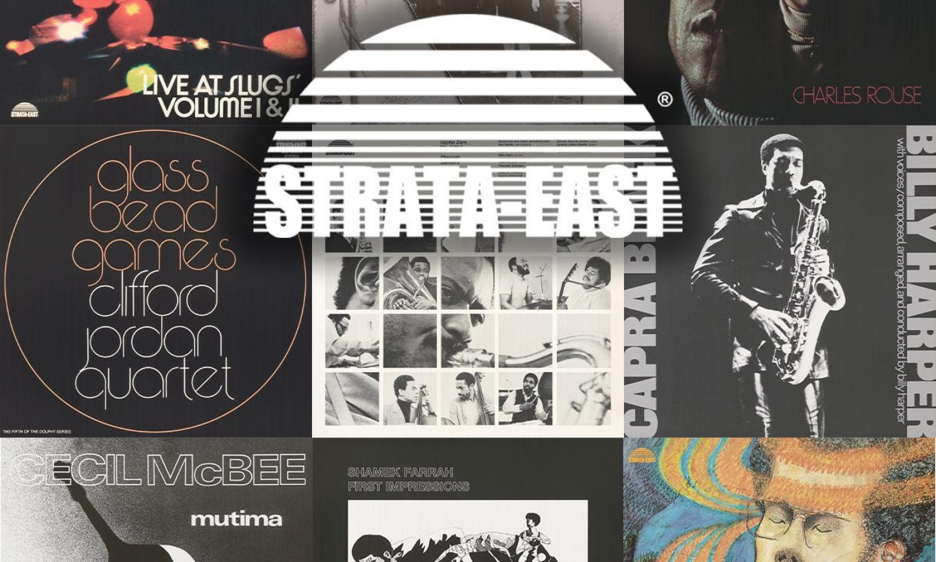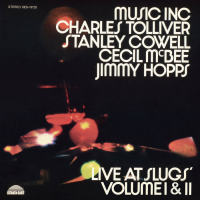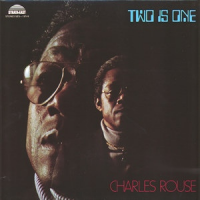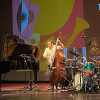Home » Jazz Articles » Multiple Reviews » The Sun Rises Again on Strata-East Records
The Sun Rises Again on Strata-East Records

Fans of classic post-bop, avant-garde, and spiritual jazz will rejoice at the news of Mack Avenue Music Group’s partnership with Strata-East Records, a pioneering independent label founded in 1971 by trumpeter Charles Tolliver and pianist Stanley Cowell. Many Strata-East releases are being reissued on CDs, deluxe all-analogue vinyl LP packages, and digitally through streaming services, many for the first time since their original issue.
 Charles Tolliver's Music Inc.
Charles Tolliver's Music Inc. Live At Slugs' Volume I & II
Strata-East
1972
The story of Strata-East begins with Tolliver and Cowell, who by 1970 had already appeared as sidemen on many superb records by artists such as Bobby Hutcherson, Jackie McLean, Max Roach, Horace Silver, Roy Ayers, and Marion Brown. As an artist-run company, Strata-East would put the musicians first, recording jazz players such as Clifford Jordan, Cecil Payne, Sonny Fortune, Harold Vick, and Billy Harper in a variety of live and studio settings of their own choosing. Across more than 50 Strata-East releases in the 1970s, one of the best known is Winter In America by Gil Scott-Heron and Brian Jackson, which, propelled by the widely-covered and -sampled single "The Bottle," sold over 300,000 copies and influenced future hip hop artists.
Recorded May 1, 1970 at the storied East Village jazz club and initially released in two separate volumes in 1972 and 1973—brought together in one release here for the first time—Live At Slugs' captures Tolliver with his group Music Inc., featuring label partner Cowell along with bassist Cecil McBee and drummer Jimmy Hopps. This is an expansive, well-recorded live set, with each player full of fiery invention. Opener "Drought" begins in classic spiritual jazz fashion, with Tolliver's bugle-like calls over ripples of piano, cymbals, and McBee's bowed bass drone. Soon enough, a theme emerges and the group are off to the races, with Hopps driving a fast post-bop swing punctuated by Tony Williams-like hi-hat explosions. Cowell solos first, let down only by a few out-of-tune keys (one wonders whether Slugs' ever tuned that piano, given that it is consistently off across the many live albums recorded there!). The pianist lays out for the first part of Tolliver's rapid-fire solo before joining in to bring back the theme, concluding an exciting start to the set.
McBee's "Felicite," the beautiful ballad that follows, is a highlight of the album. Its wistful melody, anchored by the bassist's effective plucking and strumming, is periodically interrupted by free episodes during which it seems the tune suddenly went over a waterfall: a jumble of notes cascade downward until they coalesce in a pool of sound from which the melody resumes. It's a fascinating effect. Cowell's "Orientale" is an 18-minute workout with a fast Latin-inspired tune, rather reminiscent of the feel of John Coltrane's "Olé." About 14 minutes in, the band breaks down for a beautiful bowed bass solo by McBee before the suspended, evocative intro material returns, bringing Volume I to a close.
The second volume opens with Tolliver's "Spanning," a modal tune in 7/4 time firmly driven by the trumpeter, who displays the breadth of his playing in a solo full of Spanish-style trills. Cowell and McBee follow as Tolliver (presumably) picks up a tambourine to add to the off-kilter rhythm laid down by Hopps. McBee's "Wilpan's," also recorded by Charles Lloyd and Chico Freeman as "Wilpan's Walk," is an upbeat tune with a strong theme and a dancing rhythm that inspires some of Tolliver's best playing on the set. It is 10 minutes of pure delight that also features a winning bass solo by the composer. Closing the double album is "Our Second Father," which is dedicated to the memory of John Coltrane, only three years gone at the time of the Slugs' recording. Given the Strata-East "spiritual jazz" aesthetic, one might have expected this to reflect 'Trane's late period style of drones, bells, and mantras, but no: this is a super-fast hard bop workout for all four players. Hopps and McBee provide relief by periodically dropping into a loping half-time groove before reverting to full-steam ahead. Cowell in particular is noteworthy in his wide-ranging solo, and the drummer gets a chance to shine in an exciting solo before an extended rhapsodic ending brings side 4 to a close. (Streaming versions of the set, but not the vinyl-matching CD, include three extensive bonus tracks: "On The Nile," "Ruthie's Heart," and "Repetition," all excellent as well).
 Charles Rouse
Charles Rouse Two Is One
Strata-East
1974
Best known as Thelonious Monk's longest-term (and perhaps most sympathetic) sparring partner (1959-1970), saxophonist Charlie Rouse (credited here as "Charles Rouse") was not prolific as a leader on records. A 1957 LP for Bethlehem (The Chase Is On, with Paul Quinichette) and 1960 LPs for Jazzland (Takin' Care of Business) and Epic (Yeah!) are all largely forgotten today. Only his 1962 Blue Note LP Bossa Nova Bacchanal has seen recent notable reissues. It is therefore especially heartening to see Two Is One, his 1974 Strata-East album and his first as a producer with full creative control, receive the deluxe reissue treatment on vinyl, CD, and streaming formats.
Rouse's astute, soulful tenor playing is marked by a slight rasp to his tone and a tendency to end phrases with a characteristic upward "cry." This personality is well on display on Two Is One, but the setting is vastly different than that of the 1960s Monk quartet. This is an expanded group featuring two guitarists (George Davis and Paul Metzke), percussion (Azzedin Weston and Airto Moreira), and an amplified cello (Calo Scott) in addition to David Lee on drums and either Martin Rivera or a young Stanley Clarke on bass. To a first approximation, side one is the "funky" side, featuring three tunes: George Davis's "Bitchin" and "In A Funky Way" and Joe Chambers' "Hopscotch." Side two is the "avant-garde" side, including the 12-minute Rouse title tune and David Lee's 10-minute "In His Presence Searching."
"Bitchin" starts the record off with a funky backbeat-driven modified blues. R&B guitar phrases and Scott's sawing cello frame Rouse's laconic tenor sax melody before the guitarists, followed by the leader, solo. It is a pleasant groove and an interesting mix, if not particularly outstanding as a tune. Better is "Hopscotch," a thorny be-boppish tune played in unison by Rouse and Metzke over a repetitive Clarke bass line. Rouse's subdued solo has a very appealing air of mystery, and Metzke follows with a fragmented solo that recalls John McLaughlin's work on the early fusion albums of Miles Davis. It is no wonder that the Beastie Boys sampled this track on Check Your Head (Capitol/Grand Royal, 1992). "In A Funky Way" (an explicit Miles reference, one assumes) is a great groove that calls to mind Frank Zappa's tunes of the era, with Scott's cello filling a similar role to that of Don "Sugarcane" Harris' violin. Rouse's characteristic tone is deployed in an appealingly breezy r&b solo over the top.
Things get decidedly less listener-friendly on "Two Is One": the first section pits three rhythms (9/8, 6/8, and 3/4) against each other in a maddening ostinato, while even the calmer second section has a 7/8 cello part against the 4/4 group. It is fascinating, if rather startling, but by the end of this long tune, a funky groove is established that allows some enjoyable ensemble interaction. The introduction of "In His Presence Searching" curiously melds a spiritual jazz atmosphere, with bowed bass and cello and percussion, with an almost Baroque harpsichord-like guitar figure. The result would make a great theme for a 1970s horror movie! A percussion interlude leads to a second section that establishes an uneasy swing over which Rouse (who plays both tenor and bass clarinet on this tune), Scott, Metzke, and Clarke solo before the intro section returns to end the track and the album.
Both of these vinyl releases are exemplary, with superb sound, flawless vinyl pressings, and sturdy gatefold Stoughton tip-on sleeves. Along with a Record Store Day-exclusive vinyl release of Pharoah Sanders' Izipho Zam (My Gifts) (recorded 1969, released 1973), a concurrent vinyl reissue of Cowell's Musa: Ancestral Streams (1974), and many more classic Strata-East albums now available on streaming services, Live At Slugs' and Two Is One herald a welcome return of an important independent jazz label courtesy of the Mack Avenue Music Group.
Tracks and Personnel
Live At Slugs' Volume I & IITracks: Drought; Felicite; Orientale; Spanning; Wilpan's; Our Second Father
Personnel: Charles Tolliver: trumpet; Stanley Cowell: piano; Cecil McBee: bass; Jimmy Hopps: drums
Two Is One
Tracks: Bitchin; Hopscotch; In a Funky Way; Two is One; In His Presence Searching
Personnel: Charles Rouse: tenor saxophone, bass clarinet; George Davis: guitar; Paul Metzke: guitar; Martin Rivera: bass; Stanley Clarke: bass; Airto Moreira: percussion; Azzedin Weston: percussion; David Lee: drums; Calo Scott: cello
Tags
Multiple Reviews
Joshua Weiner
DL Media
Charles Tolliver
Stanley Cowell
Music Inc.
Thelonious Monk
Charlie Rouse
Strata-East
Bobby Hutcherson
Jackie McLean
Max Roach
Horace Silver
Roy Ayers
Marion Brown
Clifford Jordan
Cecil Payne
Sonny Fortune
Harold Vick
billy harper
Gil Scott-Heron
Brian Jackson
cecil mcbee
Jimmy Hopps
Tony Williams
John Coltrane
charles lloyd
Chico Freeman
Paul Quinchette
George Davis
Paul Metzke
Azzedin Weston
Airto Moreira
Calo Scott
David Lee
Martin Rivera
Stanley Clarke
Joe Chambers
john mclaughlin
Miles Davis
Beastie Boys
Frank Zappa
Don "Sugarcane" Harris
Pharoah Sanders
PREVIOUS / NEXT
Support All About Jazz
 All About Jazz has been a pillar of jazz since 1995, championing it as an art form and, more importantly, supporting the musicians who make it. Our enduring commitment has made "AAJ" one of the most culturally important websites of its kind, read by hundreds of thousands of fans, musicians and industry figures every month.
All About Jazz has been a pillar of jazz since 1995, championing it as an art form and, more importantly, supporting the musicians who make it. Our enduring commitment has made "AAJ" one of the most culturally important websites of its kind, read by hundreds of thousands of fans, musicians and industry figures every month.




















